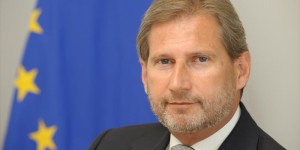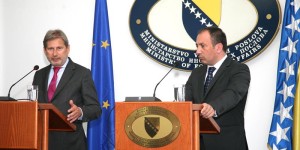“Enhancing Growth through Regional Action – SEE 2020”
Ladies and Gentlemen, Excellencies
On
behalf of DG Enlargement, and the European Commission more broadly, I
am pleased to have the opportunity to address you today. And I look
forward to hearing of the main results of this ambitious CEI – RCC
partnership project. This region still has so much to gain from enhanced
trade and cooperation that we must continue to explore every avenue and
pursue every opportunity. The SEE 2020 agenda is an important
contribution to this process.
In this context, I also look
forward to this morning's discussion on reconnecting regional and
national agendas. Ultimately, the countries of South East Europe must
move in the same direction and that direction is, of course, toward
enhanced integration with the European Union. We are here to help.
But
the process of European integration requires a tireless dedication to
economic reforms and it is often difficult to keep going. As many of you
will have read, the latest Report from the EBRD is called “Stuck in
Transition?” And this description is sadly true of many countries in the
region. We need to reignite the process of reform and to convince the
people of these countries that there are significant benefits to be
gained from one last push.
Countries that embrace economic
reforms do get significant and early benefits that can lead to a
virtuous cycle of modernisation and growth. The three Baltic countries,
for example, who initiated a second round of reforms after 2008, posted
by far the strongest growth rates in the whole of the European Union and
Central and Eastern Europe for the past three years (2011-13).
In
its annual assessment of enlargement in October, the European
Commission emphasised the need to embark on a fresh push in enlargement
countries. And, with this in mind, Commissioner Fule outlined a new
approach to economic governance at the EBRD conference in London on 24
February.
The EU wants to continue to support the region in
meeting the challenges of enhancing competitiveness, boosting growth and
creating jobs. Over the past five years, we have faced the same
challenges in the European Union. And our efforts to tackle the crisis
are bringing results.
Unfortunately, none of the Western Balkan
countries can truly be described as a functioning market economy.
Unemployment across the region is high and the young are particularly
affected. Public deficits and debt levels have been rising. And
countries are vulnerable to external shocks.
The drive to
improve competitiveness and level the playing field of opportunity is
often hindered by the politicisation of decisions that should be
market-driven and by the barriers posed by corruption. The rule of law
is particularly important in delivering the legal certainty that gives
confidence to investors. And investment is the hand maiden of reforms.
More
generally, the reform of public finances and of labour market
institutions and a reduction in administrative burdens for businesses
should be priorities. Investments in education, skills and research also
need to be high on the agenda.
The EU will begin a new dialogue
on National Economic Reform Programmes. And we will, together with the
IMF, give technical assistance to support the implementation of country
specific recommendations. Also, the EU will invite countries to give
overviews of their structural reform plans across the sectors of most
concern for improved competiveness and growth. These overviews will
sharpen the focus on key reforms.
Commissioner Fule recently
explained, here in Sarajevo, how this enhanced dialogue will also help
to accelerate the implementation of European Union funded projects.
The
South East Europe 2020 Strategy for Jobs and Prosperity in a European
Perspective could be a key reference point for the Commission, the
International Financial Institutions and for the countries of this
region as they identify these important tasks.
Thank you



